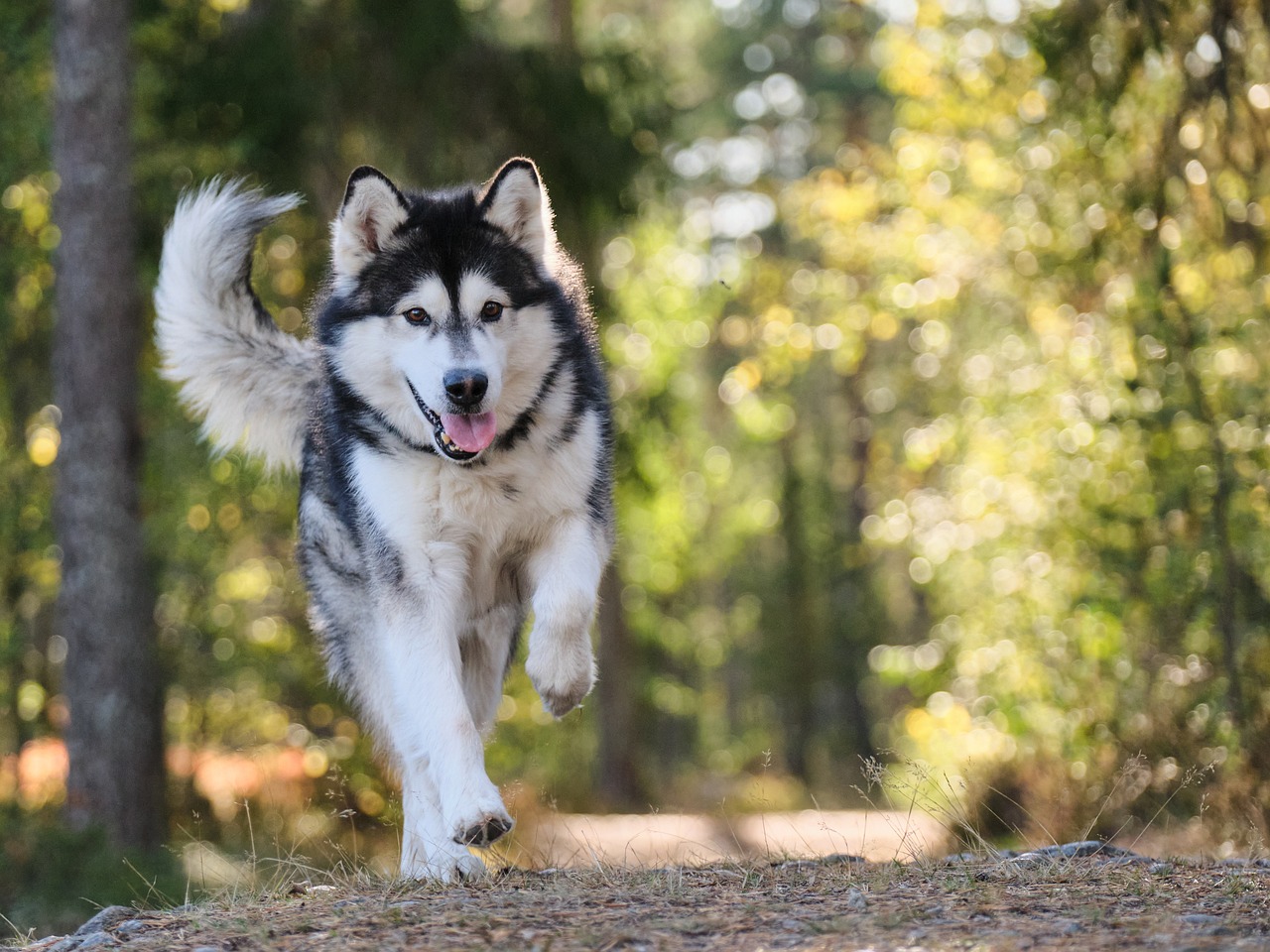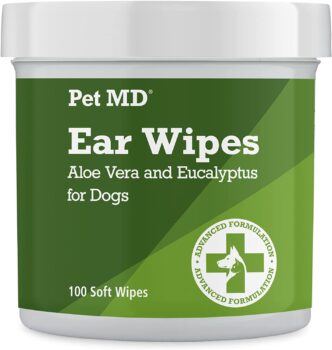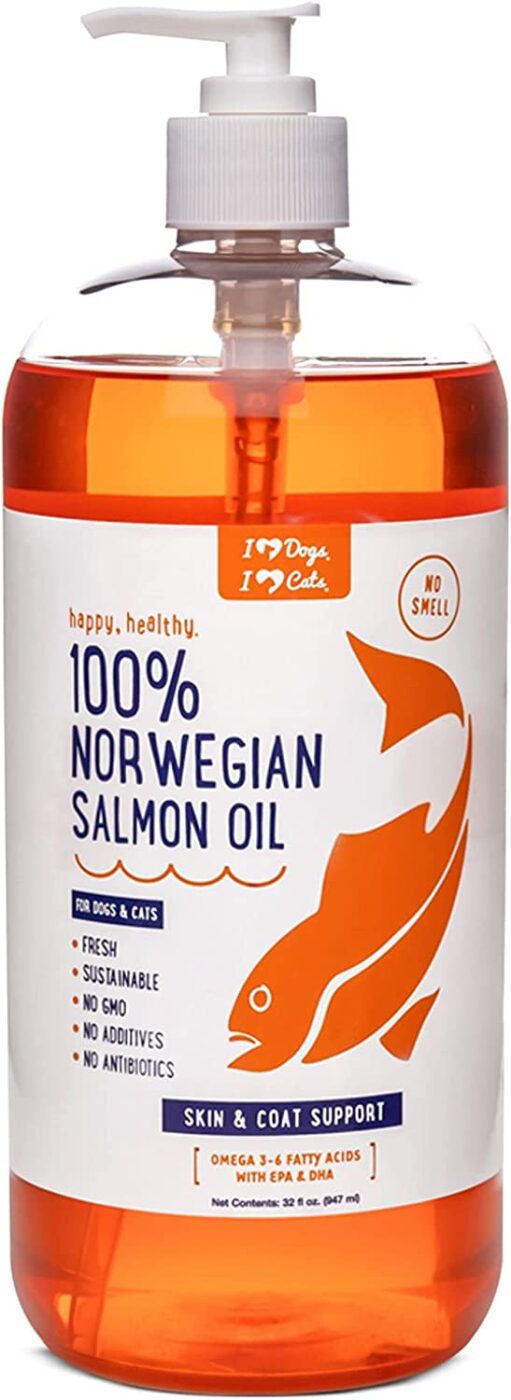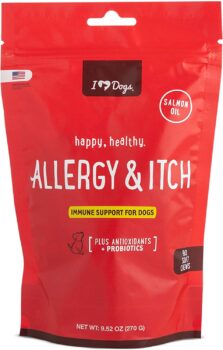Alaskan Malamutes, with their cheerful disposition and impressive physicality, is a popular breed. However, they are susceptible to ear infections due to their droopy ears which create an ideal environment for bacteria and yeast. Nevertheless, with effective preventive strategies and treatments, ear infections can be significantly reduced in these resilient canines. Here, we present 11 ways to treat and prevent ear infections in Alaskan Malamutes, underlining the role of Omega-3 in their diet to combat allergies.
iHeartDogs is reader supported. Some of the links below may be paid affiliate links, where we receive a small commission on a product at no additional cost to you.
1. Regular Ear Cleaning
Cleaning your Alaskan Malamute’s ears once a week with a vet-approved solution can help prevent the buildup of wax and debris, reducing the risk of ear infections.
Our favorite ear cleaner is these PetMD brand ear wipes on Amazon.
2. Thorough Drying of Ears
After a bath or swimming session, ensure to thoroughly dry your Malamute’s ears. Moisture in the ear canal creates a suitable environment for bacterial and yeast growth.
3. Regular Vet Check-ups
Routine vet check-ups can help detect early signs of an ear infection, allowing prompt treatment. Regular visits to the vet are a cornerstone of your Malamute’s overall health management.
4. Appropriate Use of Prescribed Medication
If your Malamute develops an ear infection, the vet may prescribe medications such as antibiotics, antifungals, or steroidal anti-inflammatories. Ensure your dog completes the full course of the medication to prevent reinfection.
5. Dietary Adjustments
Some foods may trigger allergies in Alaskan Malamutes, causing inflammation and possibly leading to ear infections. Consult with your vet if your dog may benefit from a diet change.
6. Incorporation of Omega-3 Fatty Acids in Diet
Omega-3 fatty acids, known for their immune-boosting and anti-inflammatory properties, can significantly benefit your Malamute. The inclusion of Omega-3 in their diet, either through supplements or Omega-3-rich food, can help combat allergies, reducing the risk of ear infections.
We’re fans of this Norwegian salmon oil on Amazon. It’s a bright orangish-pink color and has no fishy smell at all due to it’s ultra high purity.
7. Allergen Avoidance
Identify and avoid potential allergens that may cause an allergic response in your Malamute. This could include certain food types, pollen, dust mites, and molds.
A few good supplements to help your dog’s allergies are apple cider vinegar, quercetin, and colostrum, all of which are found in many natural allergy supplements like this one.
8. Immunotherapy
In cases of persistent ear infections due to allergies, your vet might recommend immunotherapy. This involves exposing your dog to small amounts of the allergen to gradually build immunity.
9. Maintenance of a Healthy Weight
Alaskan Malamutes can be prone to obesity, which can complicate ear infections. Regular exercise and a balanced diet are critical to maintain your dog’s health and prevent ear infections.
10. Use of Dog-Specific Ear Care Products
Human ear care products may cause harm to your dog. Always opt for vet-approved, dog-specific products for ear cleaning.
11. Surgery
In severe or chronic cases, a surgical procedure might be necessary to improve ventilation in the ear canal. However, this is usually considered as a last resort.
Frequently Asked Questions (FAQs)
- Why are Alaskan Malamutes prone to ear infections? Their floppy ears create a warm, moist environment that promotes bacterial and yeast growth, leading to infections.
- What are the signs of an ear infection in my Malamute? Symptoms may include ear redness, swelling, discharge, foul odor, and your dog frequently shaking their head or scratching their ears.
- How often should I clean my Malamute’s ears? Typically, weekly cleaning is recommended. However, your vet may suggest a different frequency based on your dog’s specific health needs.
- Can diet affect my Malamute’s ear health? Yes. Certain foods can trigger allergies leading to inflammation and potential ear infections. Including Omega-3 fatty acids in your dog’s diet can help reduce inflammation and strengthen the immune system.
- Are ear infections in Alaskan Malamutes serious? If left untreated, ear infections can lead to chronic problems and potential hearing loss. Hence, early detection and treatment are vital.
- Can I use human ear cleaning products for my Malamute? No. Always use vet-approved, dog-specific products for ear cleaning to avoid potential harm.
- How can Omega-3 fatty acids benefit my Malamute? Omega-3 fatty acids can boost the immune system and reduce inflammation, thereby helping prevent allergies and subsequent ear infections.
- What type of exercises are suitable for my Malamute? Alaskan Malamutes enjoy activities that engage both their body and mind. Hiking, agility training, and playing fetch are excellent options.
- Can ear infections in Malamutes be permanently cured? While permanent cure is not guaranteed due to their physiological traits, regular ear care, diet adjustments, and other preventive measures can significantly mitigate the frequency and severity of ear infections.
- How can I tell if my Malamute is allergic to something? Signs of allergies include excessive itching, redness, swelling, and recurrent ear infections. If you suspect an allergy, consult your vet for testing and treatment.
In conclusion, despite their susceptibility to ear infections, Alaskan Malamutes can lead a healthy life with appropriate preventive and treatment strategies. Regular ear care, incorporating Omega-3 fatty acids in their diet, and routine vet check-ups can ensure your Malamute enjoys a robust, infection-free life.




 Toledo, United States.
Toledo, United States.